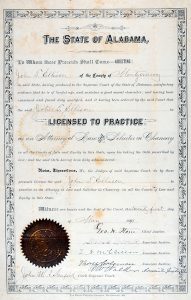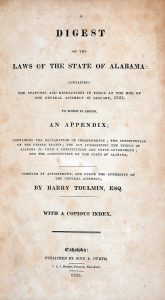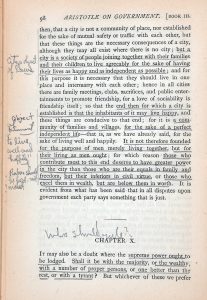 The Farrah Hall Benches Exhibit can be viewed in person at the Bounds Law Library, study room 207.
The Farrah Hall Benches Exhibit can be viewed in person at the Bounds Law Library, study room 207.  The editors of Litera Scripta would like to announce a unique new addition to our collections. As part of a recent donation, we have installed an exhibit that features a desk and chair set from Alabama's old senate chamber. The Alabama senate desk and chair exhibit is located at the entrance to our John C. Payne Special Collections Reading Room.
The editors of Litera Scripta would like to announce a unique new addition to our collections. As part of a recent donation, we have installed an exhibit that features a desk and chair set from Alabama's old senate chamber. The Alabama senate desk and chair exhibit is located at the entrance to our John C. Payne Special Collections Reading Room.  The winner of the 2019 Harper Lee Prize for legal fiction is Sharon Bala’s The Boat People. Bala is an author living in St. John’s, Newfoundland and Labrador. She is the ninth author to win the prize authorized by the late Harper Lee for a book-length work of fiction that best illuminates the power of lawyers to effect change in society.
The winner of the 2019 Harper Lee Prize for legal fiction is Sharon Bala’s The Boat People. Bala is an author living in St. John’s, Newfoundland and Labrador. She is the ninth author to win the prize authorized by the late Harper Lee for a book-length work of fiction that best illuminates the power of lawyers to effect change in society.  Several decades into the digital revolution, it is clear that digital devices have had an enormous impact upon the routines of literacy. This effect is every bit as profound as that brought about by the print revolution of the fifteenth and sixteenth centuries. Moreover, the digital universe is arguably much broader than the universe of moveable type. After all, the latter, in simplistic terms, was only a superior way to deal with a medium—parchment/paper—that had been around for millennia. In both cases, the “revolution” involved enhancements in the production, dissemination, and storage of information. But power over information has always meant power plain and simple for the persons in charge of society.
Several decades into the digital revolution, it is clear that digital devices have had an enormous impact upon the routines of literacy. This effect is every bit as profound as that brought about by the print revolution of the fifteenth and sixteenth centuries. Moreover, the digital universe is arguably much broader than the universe of moveable type. After all, the latter, in simplistic terms, was only a superior way to deal with a medium—parchment/paper—that had been around for millennia. In both cases, the “revolution” involved enhancements in the production, dissemination, and storage of information. But power over information has always meant power plain and simple for the persons in charge of society.  This post offers a glimpse into the home study of United States Supreme Court Justice Hugo Black through descriptions of its furnishings and numerous books. Several books illustrate Black’s significant interest in the classics while Martin Luther King, Jr.’s book, Stride Toward Freedom, provides an example of the many books Black received as gifts containing interesting inscriptions.
This post offers a glimpse into the home study of United States Supreme Court Justice Hugo Black through descriptions of its furnishings and numerous books. Several books illustrate Black’s significant interest in the classics while Martin Luther King, Jr.’s book, Stride Toward Freedom, provides an example of the many books Black received as gifts containing interesting inscriptions.  The winner of the 2018 Harper Lee Prize for legal fiction is C.E. Tobisman’s Proof.
The winner of the 2018 Harper Lee Prize for legal fiction is C.E. Tobisman’s Proof.  The books presented in this post may seem to be nothing more than dusty old lawbooks, but they are in fact the mortal remains of Alabama’s frontier period. The energetic, mostly young men who made up Alabama’s legislatures faced the issues—national and local—of Jacksonian America. In response they spelled out their attitudes, self-interests, and startling biases for future generations to ponder. So in the adventurous spirit of that time, we invite our readers to read the signposts of what were once new ideas. We encourage you to visit our physical exhibit “Early Statutory Compilations and Codes” located in the main hall of UA’s Law Library.
The books presented in this post may seem to be nothing more than dusty old lawbooks, but they are in fact the mortal remains of Alabama’s frontier period. The energetic, mostly young men who made up Alabama’s legislatures faced the issues—national and local—of Jacksonian America. In response they spelled out their attitudes, self-interests, and startling biases for future generations to ponder. So in the adventurous spirit of that time, we invite our readers to read the signposts of what were once new ideas. We encourage you to visit our physical exhibit “Early Statutory Compilations and Codes” located in the main hall of UA’s Law Library.  The following post, “Alice in Court,” seeks to describe the legal aspects of one of the world’s great fantasy stories–Alice’s Adventures in Wonderland by Lewis Carroll. The exhibit includes works in a Lewis Carroll collection assembled by Litera Scripta co-editor Paul M. Pruitt, Jr.
The following post, “Alice in Court,” seeks to describe the legal aspects of one of the world’s great fantasy stories–Alice’s Adventures in Wonderland by Lewis Carroll. The exhibit includes works in a Lewis Carroll collection assembled by Litera Scripta co-editor Paul M. Pruitt, Jr.  Hugo Black and the Classics is an exhibit in the University of Alabama School of Law Library’s Hugo Black Study that offers insight into Justice Black’s strong interest in Greek and Roman classical works. The collection shown here represents one component of the more than one thousand volumes of Black’s books held at the Bounds Law Library.
Hugo Black and the Classics is an exhibit in the University of Alabama School of Law Library’s Hugo Black Study that offers insight into Justice Black’s strong interest in Greek and Roman classical works. The collection shown here represents one component of the more than one thousand volumes of Black’s books held at the Bounds Law Library.  On March 1, 1954, two hundred and fifty-four members of the Eighty-third Congress were debating immigration issues when a Puerto Rican Flag was unfurled and pistol fire erupted in the House of Representatives chamber. Four Puerto Rican nationalists fired thirty shots at the representatives below, wounding five of them. One of the wounded was the Democratic representative from Alabama’s Fourth District, Kenneth A. Roberts who was shot in the leg. This exhibit represents items in our collections from this event.
On March 1, 1954, two hundred and fifty-four members of the Eighty-third Congress were debating immigration issues when a Puerto Rican Flag was unfurled and pistol fire erupted in the House of Representatives chamber. Four Puerto Rican nationalists fired thirty shots at the representatives below, wounding five of them. One of the wounded was the Democratic representative from Alabama’s Fourth District, Kenneth A. Roberts who was shot in the leg. This exhibit represents items in our collections from this event.